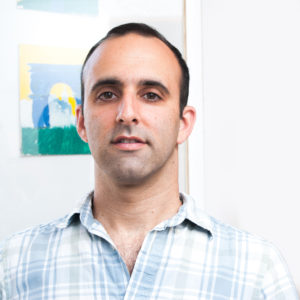Eli Kaplan-Wildmann and Tikva Hecht
Eli Kaplan-Wildmann lives in Jerusalem and loves creating and designing in the ancient city. His favorite projects there include designing for the Jerusalem Opera, Psik, and the Jerusalem Light Festival. He directed several musicals including Hairspray, Singin’ In The Rain and an original musical, Solika, based on the Moroccan tale. In New York, where he studied, taught and worked, he designed off-Broadway. He is a gabbi at Jerusalem’s traditional egal community Sod Siach, and is a former chair of “Havruta – Religious Gay Men.” Eli created Unbound – The Recreated Haggadah and Shabbat Unbound, visual books that infuse familiar Jewish moments with excitement and creativity.
Eli’s course at this Summer’s Institute is called Creativity In Jewish Ritual: The People Of The Visual, Unbound Book. As society becomes more visual, and we are all artists curating our feeds and designing our stories, we need to ask how our Judaism fits into this changing world. In this class, we will become familiar with the Unbound Books that designer Eli Kaplan-Wildmann has developed, both looking at examples and creating our own. These books take the traditional physical forms of Jewish text – leafs of paper sewn together in order – and turn them into colorful and inspiring creations. We will do a series of exercises in using paper and other simple materials to express specific Jewish ideas and ceremonies. There will be general craft elements available that we will work with, and participants are free to bring their own as well. The final project will give each participant the chance to create a new ritual object for a Jewish tradition that doesn’t yet have such an object, that the participants will get to use every year starting soon after Institute finishes.
Tikva Hecht is a poet and fiction writer based in Toronto, Canada. Her work has appeared in CV2, Canadian Literature, Ghost Town, The Broken Plate, HuffingtonPost Canada and other online and print publications.
About the Timbral Artist-in-Residence
The Timbrel Artist-in-Residence teaches a four-session course during the Summer Institute, in addition to leading community-wide programming. Artists-in-Residence will receive credit for free tuition, room, and board, program admissions to the Institute, a stipend, and a small budget. Artists from all disciplines are welcome; Jews of Color and Jews with disabilities are especially encouraged to apply. Past artists have represented the disciplines of music (vocal and instrumental), theater and storytelling, puppetry, poetry, visual arts, and dance.
Direct any questions to office@havurah.org







